by Michael | Jun 26, 2017 | Blog
Speech-writing – for whatever occasion – is likely to fill you with dread.
However, help is at hand!
I am pleased to say that I have persuaded Shirley Wootten to share her experiences with us.
Shirley is a copywriter and the founder of stress-free speeches, a business she set up to coach anyone worried about having to give a speech at a wedding (or any other social event).
She’s been involved in local theatre for 30 years – acting and directing – so she knows what stage fright feels like, and can find ways to improve a performance.
She has come up with a process that will smooth away most, if not all, of your worries in this area! Read on, and learn!
Taking the fear out of writing a speech
It can be daunting, to say the least, to come up with a speech to mark an occasion.
A couple of deep breaths at this point will work wonders. And now we’re going to break the task down into small steps.
Let’s assume that you’ve had plenty of warning. If you’re a top table guest at a wedding, you’ve probably been in the know for months. This is good, because the Most Important Advice is to give yourself time to write the speech. Begin at least a month before the big day.
Next, recognise that even world-famous writers tremble at the prospect of a blank sheet of paper. You’re in good company.
So let’s do something about that blank sheet. Whether you’re writing or typing, starting off with something silly often helps to break the fear. Just setting down, ‘I can’t think of anything to say’ will get you off the mark and make sure that the page isn’t blank any more. Then you can either continue in the same vein for a while – a whole paragraph expanding on the fact that you have nothing to say – or begin to list a few of the ideas you’d like to get across.
You’re on your way.
Brainstorming
If you’re struggling to know what to say in your speech, or to organise your thoughts, a brainstorming session can be helpful and good fun to boot. It works best with pen and paper – or coloured pencils, crayons, anything that takes your fancy – rather than a keyboard and a screen. (But if you just wanted to launch in and start making a list of thoughts, that would work too.)
Get a large sheet of paper and put the words ‘My Speech’ in the middle of it. Then draw a line from those words a short way and write whatever comes into your head (if you draw a bubble round each word or phrase, that will stop all the words running into each other and will help you to read everything back afterwards). So, for example, you might write ‘thank yous’ and then, out from those words, a bubble for each of the people you’d like to thank, with a further reminder next to each name of the service they provided. Then go back to the centre, run another strand out from ‘My Speech’ and start a new topic.
And so it goes on, until you’ve covered everything or writer’s cramp has kicked in. You’ll probably surprise yourself with the number of ideas you’ve jotted down, but you can now start to put the main ones into some sort of basic structure, which is the start of the speech.
Start Writing
In no particular order – because you can decide on that later – take each topic you’ve identified during the brainstorm and write a short paragraph on it. If you find you’re writing more than one paragraph, keep going until you run out of things to say, then move on to the next topic. Don’t worry about the length of the speech, or being too fussy about grammar and spelling (in fact, you might not need to worry about that at all; if you’re the one reading it on the day, you can spell words any way you like, although punctuation will help you to remember to breathe, at the very least); at this stage it’s all about getting reasonably structured thoughts on paper, unhindered.
This stage may take several sittings, as you tackle a fresh topic each time, but that’s often the way it goes, so don’t be put off or worried if it never seems to end. You’ll get there.
When you’ve worked through all the ideas that your brainstorming session produced, clip together all the pages of your rough speech, or save them on your laptop/tablet, and ignore them for a few days. This is very important and means that when you read them over, you’ll be seeing them with fresh eyes. Inconsistencies will leap out at you and you can begin the editing process.
Editing
This is not meant to be scary. This is a fun part and means that you’ll have a lovely, polished speech with which to amaze (and amuse, if appropriate) your audience.
Begin by reading the speech to yourself out loud. Just hearing the words will highlight things that you might want to change completely, or that simply don’t sound quite right. As you read through, make notes on the pages as you go – a printed copy will be helpful here – but don’t make the changes yet; keep reading out loud, through to the end. In this way you’ll hear any repetitions and can begin to choose which bits, if any, to delete.
Now go back to the start of the document and work through it, making the changes you’ve identified. As the whole thing takes shape, you can decide which order to impose on your topics, by rearranging the paragraphs to suit your purpose.
And after that, put the edited speech away again for a day or so (remember, this is important; think of it as fermentation for an ultimately fizzing, fabulous speech) and repeat the process as often as you choose, until you’re satisfied with the end result.
Subject matters
This is your speech, of course, so you can decide what to say, what to include and what to leave out. Funny is usually acceptable to everyone, but you’ll be the best judge of your own talents as a stand-up artist, so include more or less humour, as you see fit. If you know your audience well, you might share a couple of family stories that you know they’ll all appreciate. If you don’t know them so well, you may want to keep the tone a little more formal. (Word or warning here; make sure the speech is about the guest(s) of honour, not about you. A couple of self-deprecating remarks as a personal introduction will work well, but then move on to the topic in hand.)
You might want to check that your speech doesn’t cover the same ground as those given by your fellow speakers, but beyond that, you can have free range of topics. Again, you will know what is and isn’t appropriate.
Enjoy the speechwriting experience. Be as creative as you like. Everyone will appreciate your hard work and you might unearth a hidden talent. Then the fun will really start…
Shirley would be very happy to hear from you if you have any concerns about speaking in public or putting words on paper.
shirleywootten@gmail.com
Twitter: @shirleywootten
https://www.linkedin.com/in/shirley-wootten-6984b22a/
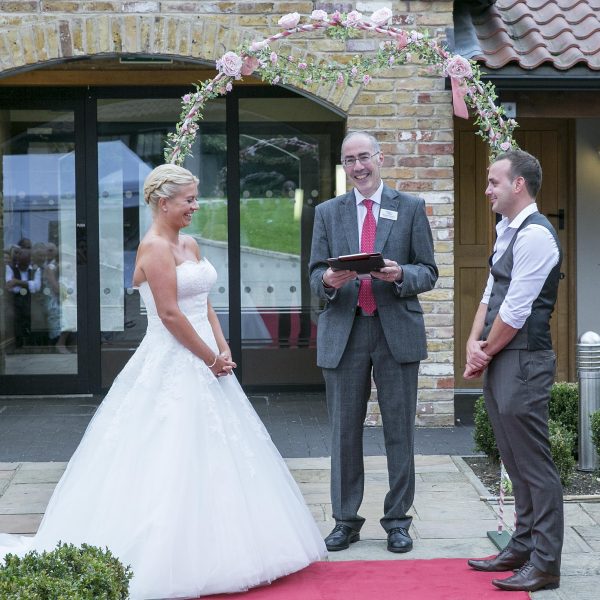
by Michael | Jun 20, 2017 | Blog
Your wedding ceremony should be the most important day of your life. Of course, you want to get it right. But what does it mean, to “get it right”?
There’s a lot of choices out there – possibly, more than you realise.

Religious, or not?
In many cases, the first decision you make together is whether or not you want a full religious ceremony. If not, do you want the other extreme? Of course, you can have a fully secular one, but maybe you prefer a mixture?
Anglican
If your choice is a Church of England ceremony, it’s easier if it’s your local church, but you can choose another one. Normally, the Vicar will be able to take you through everything. There’s no need to visit a Register Office either, as everything can be done in one ceremony. The cost of this starts at £456.
Church of Scotland
Church of Scotland ceremonies can take place anywhere and at any time (as long as your minister is in agreement). You don’t need to be a Scottish resident – but you do need to give between 15 days and three months’ notice at the Register Office.
Roman Catholic
You’ll need to take your baptism and confirmation certificates along to your priest at least six months before you wish to marry. If one of you hasn’t been baptised, your priest’s permission will be needed. You’ll be expected to attend marriage preparation classes, and to attend Mass for six weeks before your wedding day. Additionally, you need to go to your local Register Office to give notice and obtain your marriage licence.
Jewish
You will need to apply to the religious authorities and to the local Register Office. A religious ceremony will normally take place in a synagogue, but the rabbi may agree to conduct it elsewhere.
Secular
If you’re certain you want no religion, then you can opt for a humanist wedding. This will not be recognised in law, so you will still need to attend a Register Office ceremony beforehand. You can hold the humanist wedding wherever you wish, and can write your own vows and hire a humanist celebrant.
Just remember, that in a humanist ceremony, there should be no mention at all of God or even religious references, so if that’s a bit too extreme, you may want to consider a civil ceremony.
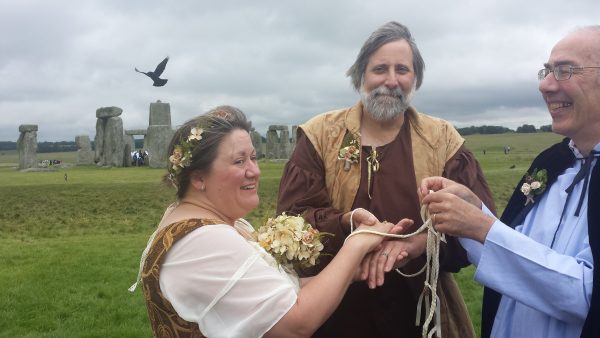 Civil Ceremony
Civil Ceremony
Like the humanist wedding, a civil wedding has no legal validity. It is simply a ceremony that is put together specially, usually by a professional civil celebrant. It should create a fabulous atmosphere and may well reflect the personalities and beliefs of the couple.
You can hold this wherever you like. If it’s in a property licensed for marriages, the registrars can be booked to come out (at an extra charge) and conduct the legal ceremony there. The civil ceremony can follow on straight afterwards. Otherwise, if not in licensed premises, you both need to go to the Register Office beforehand, with two witnesses. (This costs £35.)
Register Office
In addition to the celebrant charge, you will have to pay the registrars for the legal words to be pronounced. To organise this in the first case, go to the local Register Office to give notice. (If you’re not marrying locally, you’ll have to contact that particular Register Office to ensure they have somebody available on your chosen day.)
You’ll need ID, proof of address and nationality, any previous marriage documents and details of your venue. Once issued, the notice will be displayed for 15 days before you can legally marry. Your marriage licence is valid for a year.
You can find your civil celebrant via recommendation, Google – or at this website!
So I hope you see that there are other routes open to you than full religious or humanist. As long as the legal words are said and witnessed properly, everything else can be as original and personalised as you choose. You really can have the day of your dreams!
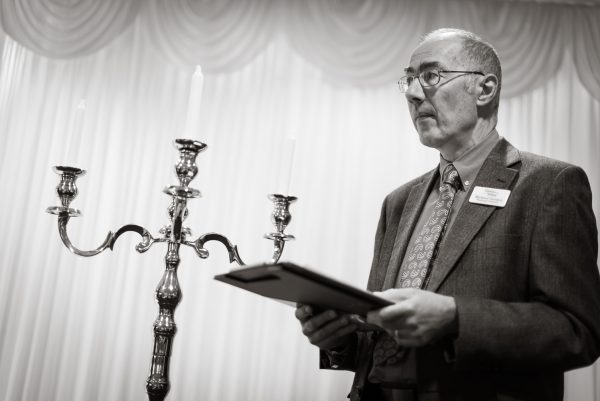
by Michael | Jun 13, 2017 | Blog
“I don’t mean to be rude, but do we actually need civil ceremonies?” The question emerged over networking when a lady I had just met found out what I did for a job.
No offence was intended, or taken. And, to some extent, she had a point.
A religious society
After all, over 50% of the UK population consider themselves Christian (according to recent research). So why would they need civil ceremonies at all? A little over 25% professed no religion. So they’ve got the option of a secular ceremony at the register office. OK, that leaves some people out, but it does cover most people.
But hold on a moment!
Religious objections
Not everyone who claims to be “religious” wants a full, standard religious ceremony, do they?
And what do you do, if you do want a religious ceremony, but are marrying someone of a different faith? Church isn’t an option, if you are Catholic and divorced. What if your church won’t accept you because you’re gay? And what if a religious service doesn’t really rock your boat, but do want a blessing or a prayer (mainly to keep parents happy, say)?
The secular option
In all those cases, when the Church won’t provide what you want, you have to turn to the Register Office. There they will read out the standard, necessary words to make your marriage legal. But, unfortunately, the ceremony must be totally secular (and impersonal). It can be a bit of a conveyor-belt operation.
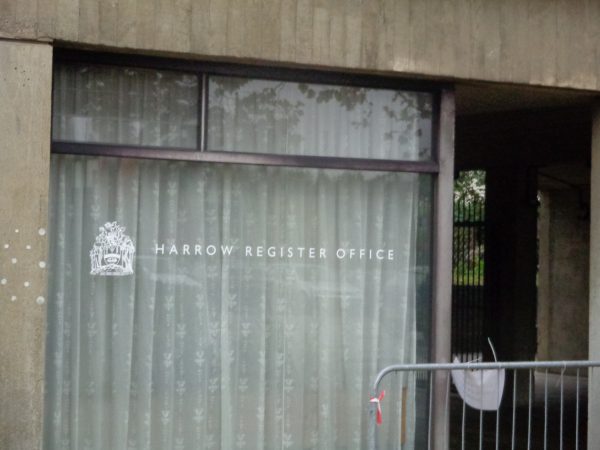
In surroundings that may not be much to write home about!
So, I hear you ask, is there another option?
A real choice
Indeed. As I explained to the lady, that is where a civil celebrant comes into his or her own.
The assets of a civil celebrant are that they build a ceremony from scratch. A good celebrant takes the time to work with the clients to offer ideas and also guidance about what is possible and might work. He will ask questions (and supply answers too), so that he can build up a full picture of what the couple wants. He will then write or compile a ceremony that reflects their personalities and beliefs, and is everything they want it to be.
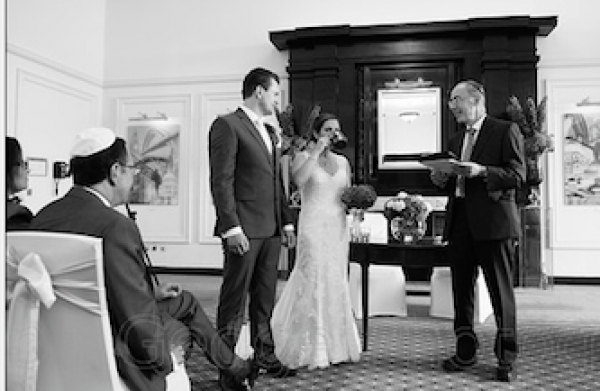
Photo courtesy of Philippa Gedge
Not only will the ceremony be personalised and unique but it will tick the other box: it can be as religious as the couple want it to be.
It should be pointed out that civil celebrants are not (yet) licensed to conduct legal marriages, so the registrar ceremony is still compulsory. However, once the legal formalities are over, you can enjoy a fabulous meaningful ceremony that will be memorable for all the right reasons!
I believe, after our conversation, that that lady understood my role a bit better – and didn’t regret her question too much!
Of course, if any reader wants to follow up with me, I’d be delighted to explain more. Please feel free!

by Michael | Jun 6, 2017 | Blog
You may have seen photos on my website of one particular wedding where I officiated. They bring back lovely memories for me (and, hopefully, for the couple concerned!). I thought I’d share the story of their wedding with you.
Lucy and Dave had already married on Skiathos in front of a few close friends and relatives. They wanted to share their happiness with their wider circle. So a wedding blessing was fixed for a Friday in August – an outside ceremony near a converted barn in the Enfield/Cheshunt area just north of London.
It had been quite a hot day, and the 5 p.m. start avoided the worst of the heat. Unfortunately, although almost everybody was ready then, that wasn’t the time the ceremony actually started. News filtered through that the best man was stuck in traffic on the M25 motorway. And before anybody asks why he hadn’t left home sooner, the fact was that he had actually been at a job interview (successful!), and had been unable to get away sooner!
So a few drinks were consumed and we all settled down to wait. While Lucy stayed secreted with her entourage, Dave was clearly a bit nervous, and this delay didn’t help him.
Another consequence of the delay was that the weather started to turn very noticeably.
However, an hour or so later than scheduled, with the best man refreshed and ready, Dave and I were positioned under a lovely floral arch. Lucy made her entrance up the red carpet leading to us. What a picture! She was radiant, resplendent, confident that all eyes were fixed admiringly upon her and her approach was stately.
The service of blessing began. After my welcome, and mention of absent friends, I talked briefly about Lucy and Dave’s story that nearly never happened (as Dave had chickened out of popping the question when the time seemed right). Anyway, the next time the opportunity arose, in Warwick Castle, he pretended to offer Lucy a chocolate bar; when she unwrapped it, she found a ring.
The ceremony continued, but about this time, a wasp decided to get involved, and it buzzed around the three of us very persistently. This didn’t help Dave’s nerves, or, if I’m honest, mine. Lucy was seemingly imperturbable, though.
This being Britain, “the show had to go on”, and as we proceeded to readings about love and then words of wisdom about marriage. This seemed to interest the wasp rather less. Unfortunately, there was a practical reason for this, which was that the heavens decided that this would be a good time to open!
As the celebrant, I felt that, although we still had a few minutes left ahead of us, we could hardly stop the ceremony. So we moved on to the significance of the rings. As we three were getting decidedly damp (most of the guests had fled for some nearby shelter), an enterprising bright spark picked up a table parasol, opened it and brought it up to the front so that Lucy (though not we men-folk) could be protected. This caused a good deal of merriment, and helped Dave to relax.
As the shower passed, I recited the lovely Apache (Navajo) wedding blessing, with its rather ironic (in the event) beginning:
“Now you will feel no rain, for each of you will be a shelter for the other. Now you will feel no cold, for each of you will be warmth to the other. Now there will be no loneliness, for each of you will be a companion to the other. Now you are two persons, but there is only one life before you. Go now to your dwelling place to enter the days of your togetherness. May beauty surround you both in the journey ahead and through all the years. May happiness be your companion, and may your days together be good and long upon the earth.”
Lucy and Dave had been adamant when we were planning the ceremony that there should be some light-hearted elements. So before we ended, there was the pagan “Jumping the Broom” ceremony. I explained that Lucy and Dave would together jump over the broom to symbolise a new beginning, a welcoming of the new – sweeping away old cares and worries. “This represents entering into a new life of husband and wife. The wood represents the strength of the commitment in the marriage. The leap symbolises joyfully taking the leap into married life together.“
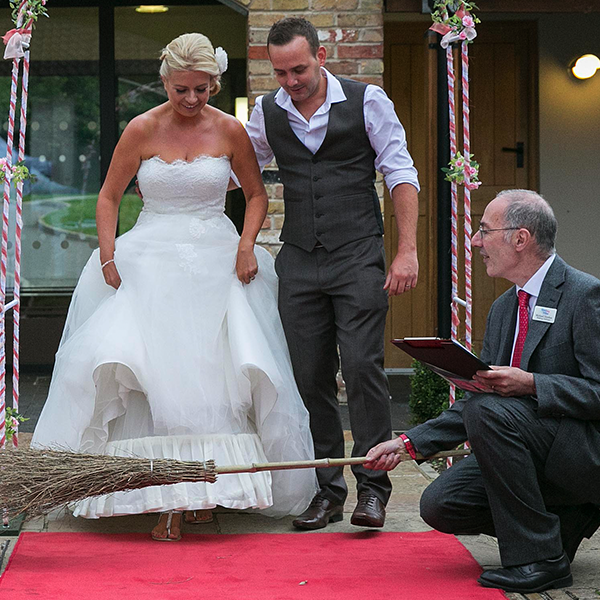
I then held the broom some two feet above the ground and invited Lucy to hurdle it in her dress. To the onlookers’ delight, she looked aghast, as was the intention. Of course, I then lowered it to a few inches above the ground!
It was a lovely, warm occasion for a delightful couple; everybody had a smile on their face, and there’s an even happier end to the story: twins for the pair a year or so later!
Wonderful memories, indeed!
by Michael | May 30, 2017 | Blog
Congratulations, if you’ve just got married! But remember that, once the excitement dies down – and the honeymoon becomes a memory – you need to focus on your marriage. How are you going to make it work?
Words
One way is to watch what you say to each other. Sticks and stones, and all that – but words really can hurt. They can be misunderstood. They can damage relationships.
Here are a few powerful words that should be used with great caution:
- Never This is so final. It can give a message that your spouse is not good enough and will never be so. The situation will not improve. Use of this word does not imply listening, compromising or sympathy.
- Always The opposite of “never”, it has similar connotations. It suggests that your spouse is wrong (and therefore that you are right) – end of story. Again, it does not suggest two-way communication or empathy.
- I Obviously, everybody needs to use this word, but, almost by definition, you are taking a selfish standpoint, and care needs to be taken as a consequence.
- You Again, a word you are likely to need in order to produce a sentence. The focus is on the other person, but the effect depends on how you use it. Beware of making it accusatory or aggressive (finger-pointing).
- But (or however, or although) Remember that these negate whatever has preceded them. Positive becomes negative. It does not build trust, intimacy or credibility.
- Swearing This often means that you have lost control – possibly, because of frustration or the realisation that you are in the wrong. Name-calling will only cause upset, especially on a regular basis. Starting from lack of respect, the path to a relationship breakdown is relatively short.
- Divorce This should not be spoken as a threat or a weapon. Nor should you accuse your spouse of destroying the marriage. This won’t resolve any conflict – indeed, it is more likely to exacerbate it.
Resolution
What is far more important and effective is to be prepared to communicate with your spouse. Invite openness. Listen to problems, and try to resolve them, possibly by use of compromise. Ask questions and try and understand. Often a problem is caused by simple misunderstanding, and can be solved easily.
Speaking (and behaving) with respect and patience is not always that easy, especially when under pressure, but ranting and raving will solve nothing. If necessary, explain calmly why you may feel irritated by a particular act or behaviour.
Counselling, or even divorce, should be last resorts. It may not always be easy, but the responsibility for making marriage work is down to both of you. So communicate before things get bad, and respect each other.



 Civil Ceremony
Civil Ceremony


